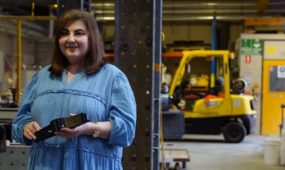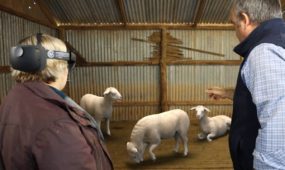Bluetooth devices usher in new era of technological advancement
Technology
A COMPANY creating Bluetooth devices to help the mining industry run more efficiently is expanding its technology for use in everyday life.

Sign up to receive notifications about new stories in this category.
Thank you for subscribing to story notifications.
South Australian company Daelibs is working in the field of ambient intelligence and is the first in the world to develop Bluetooth beacons as a location attendance device.
The technology is being used in eight mines in Australia to help companies keep track of the whereabouts and safety of staff.
Mining company workers check in at waypoints at various locations in a mine with the help of Bluetooth beacons and NFC tags that work similar to the payWave feature in a credit card.
Daelibs Managing Director Michael Jones said the ambient intelligence technology was considered by many to be the first step in the Internet of Things.
“Ambient intelligence is software that operates in the context of your physical location and is all about giving contextual information to the end user,” he said.
“In the mining sector you need to know where people are. We log when they get there, and when they leave we make sure that everyone who logged in is leaving,” Jones said.
The Australian Information Industry Association – the nation’s peak industry association for organisations in the digital economy – is working with the South Australian Government to design an Internet of Things cluster to boost the productivity, efficiency and safety of the mining and energy resources industry.
The cluster – believed to be the first of its kind in the world – aims to encourage industry collaboration, streamline the flow of information, and allow real-time decisions.
AIIA Interim Cluster Facilitator Martin Woodcock said using ambience intelligence had improved the competency of workers.
“Ambience intelligence can monitor movement, heart rate, temperature and other factors which can be used to ascertain whether a person is fit to be working or whether they may have been injured,” he said.
“This provides far richer information than currently available and moves the technology beyond location-based services,” he said.
Jones and co-CEO Paul Coldrey have created similar products for the food industry through their sister company Kinesity.
The devices are active in more than 100 Australian shopping centres and are exported to New Zealand, Indonesia and the United Kingdom.
“In essence we have Bluetooth beacons sit inside stores that send out a unique ID that our system recognises,” Jones said.
“If you have our app, it will recognise that you are nearby and we can know where you are and can send you information about that particular store.
Jones and Coldrey conceived the idea of exploring Bluetooth technology in 2012, and together expanded the business into three different companies: Daelibs, Kinesity, and Lumient.
But they initially had some challenges convincing the Bluetooth industry of its merits.
“We went to a big Bluetooth manufacturing company and spoke to them about our product,” Jones said.“They didn’t think it would work because that was not what Bluetooth was originally designed for.”
The two entrepreneurs responded by creating their own beacons.
Daelibs uses smart devices to track people and assets, Kinesity is used to connect customers and retailers and Lumient is charged with software development for the other two companies.
The software is developed in Adelaide, the capital of South Australia, but Jones and Coldrey outsource the hardware manufacturing to companies in China.
Jones said that as society became increasingly dependent on technology, Bluetooth devices would lead the way into transforming how people live their daily lives.
“More places and things will be tagged and will be able to communicate with each other,” he said.
“One day we will have robots doing household chores. We won’t be taking out the garbage or doing the dishes, they will be doing it for us.”
Jump to next article



